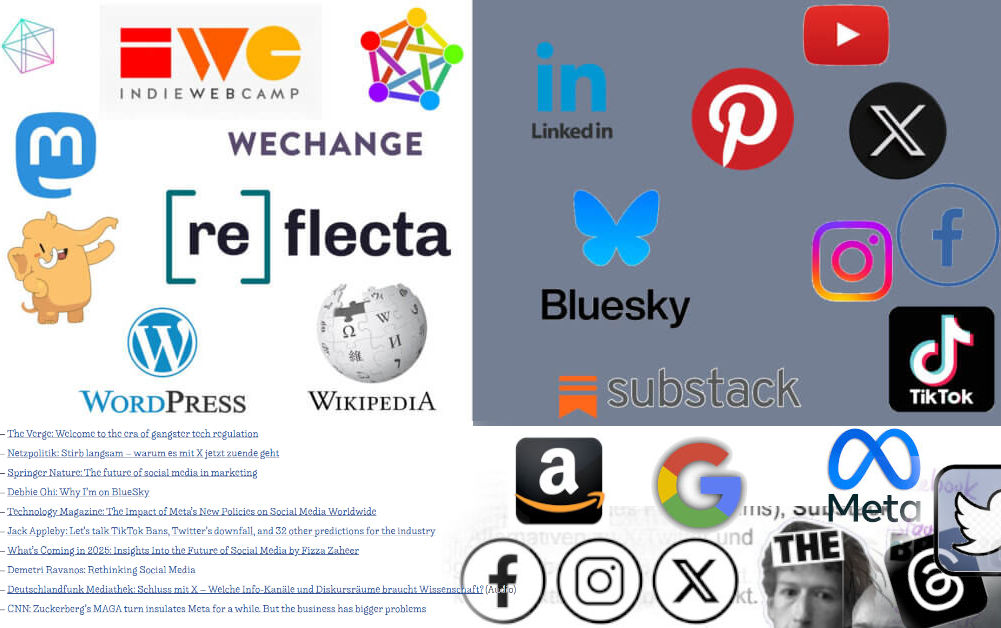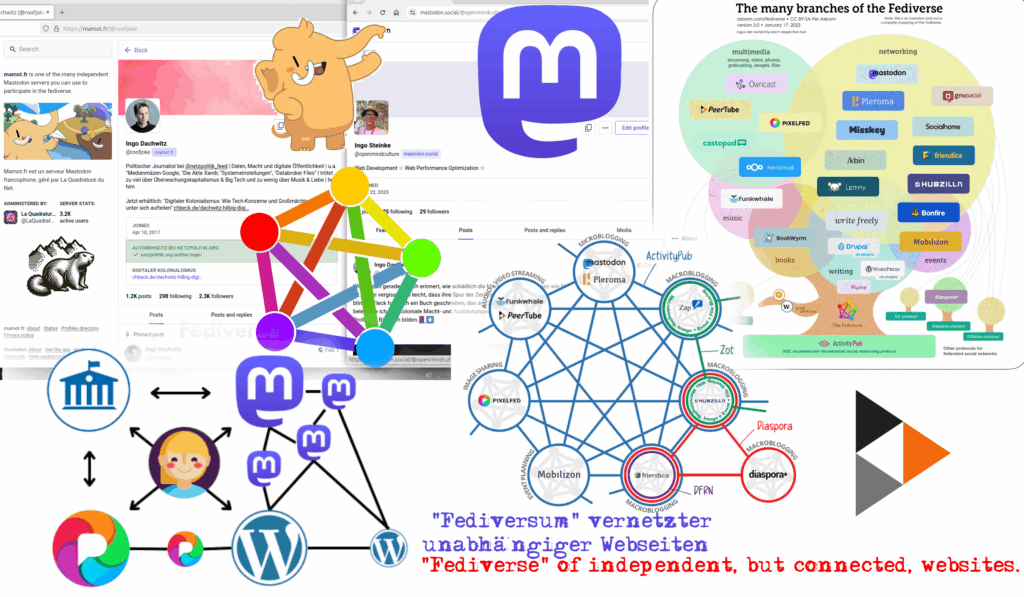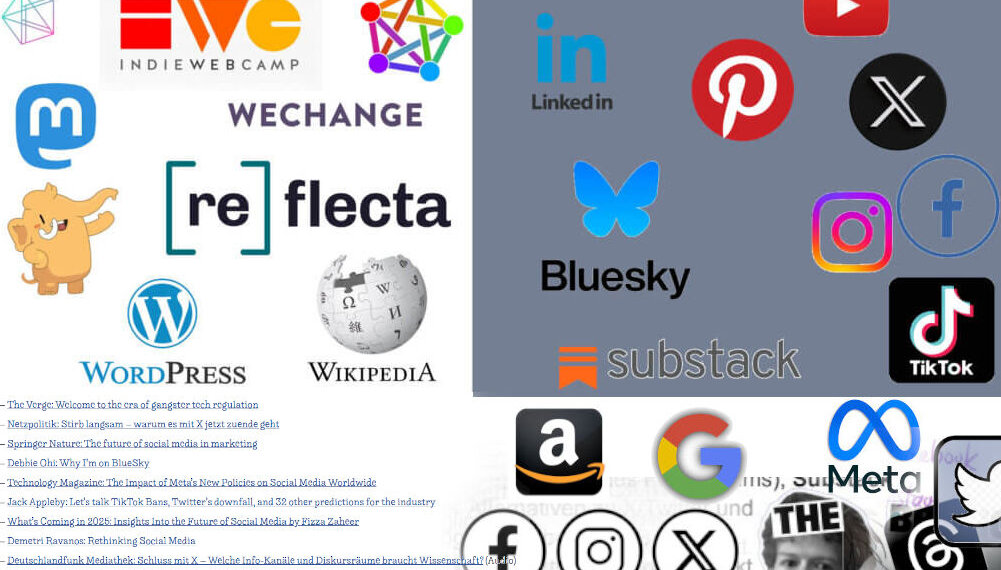“It annoys me so hard that my stories sometimes only get a tenth of their original reach as soon as I share something other than cuteness…” (Sophia Hoffmann, chef, author, and restaurateur in Berlin)
“LinkedIn, thanks for nothing! After 2 days, 53 impressions from 23 members for one post with picture. Truly insane !!! That’s 𝟬.𝟮𝟴 percent of my followers! You can’t reach anyone here outside of this circle anyway. […] As I’ve replied several times, it wasn’t even planned for this post to go viral. I still don’t understand why it happened.” (Dr. Torsten Beyer, author, speaker, founder of “Web, but green!” academy)
“Do you use one or more of these services? Whatsapp, Threads, Instagram, Facebook? Then this message is important for you: Meta Platforms feeds its AI with data from European customers. If you don’t want your data harvested this way, you should opt out in your account settings.” (source: heise.de, shared by Nicole Wolf, consultant & speaker, on LinkedIn)

LinkedIn apparently also feeds our data, provided we don’t tell it not to do so, as Alvaro Montoro explains (10 Settings to improve your LinkedIn experience).
Such problems have been around for a long time; after all, social networks are not non-profit organisations, but profit-oriented companies. But at times, it seemed easier to gain new followers as an artist or innovative start-up or to find new inspiration as an interested reader. Instagram ended the former fact check in 2025 and had already changed its algorithms before, giving posts from non-profit organisations less reach and visibility in favour of paying advertisers. (Sources: Deutschlandfunk, Netzpolitik, Heise.de, and observations of affected parties; further sources can be found in the last paragraph). The fact that the influence of companies and algorithms keeps increasing is partly due to the so-called broligarchy of American CEOs and their president. But what does broligarchy actually mean?
What does “Broligarchy” stand for?
Broligarchy, originally a surfer wordplay of ‘bro’ and ‘oligarchy’, is now also known to internet surfers as a criticism of toxic business practices and agreements, because today’s broligarchs are unfortunately CEOs and politicians whose decisions and agreements influence the everyday lives of millions of people. Tech chiefs acquire innovative start-ups like WhatsApp or Instagram and fraternise with each other and with influential politicians. The fact that ‘meta’ not only stands for one of these companies, but also as a prefix for higher-level contexts, makes the term ‘meta-broligarchy’ an obvious choice.
However, ‘meta-broligarchy’ would be misleading in that it distracts from other companies that are part of this development or affected by it, even if, as with Google, ‘don’t be evil’ was once their motto. While hardware, i.e. devices, device parts and raw materials, as well as textiles and medicines, are now largely produced in Asia, most of the software, i.e. apps, algorithms and communication software that we use in Europe, comes from the USA. Many of these software products are so popular because they are free and easy to obtain, raising suspicions that the money is earned by manipulating and monitoring the free customers, or that in the end it is not about money at all, but about power and political influence.
“Alternative Facts” and Gaslighting in Social Networks
‘Alternative facts’, deliberately false statements and bullshit claims that confuse the audience, often distract from more important issues. This tactic is also known as gaslighting. In the past, critical political decisions were made quietly while the media was busy with sporting events such as football or the Olympics. Later, we mocked the banning or promotion of light bulbs and plastic straws and the attempted renaming of the Gulf of Mexico, while decrees with far-reaching implications are signed, aides pull supposedly foreign-looking children out of school for deportation, and IT companies abolish fact-checking and diversity promotion, preemptively complying to possible further decrees.

An open mind culture implies listening and taking note of other opinions and ideas, but open mind culture does not mean accepting lies and nonsense as facts. In this blog, I try to describe current topics as universal as possible, link to relevant sources that not everyone already knows, and encourage people to think beyond current party politics.
Unavoidable Social Networks?
But what would be the alternative to smartphones, social media and practical everyday helpers like ChatGPT?
In the short term, there is no substitute for all of this without sacrificing benefits, knowledge and possibly even career opportunities. As long as it’s only individual activists who boycott the broligarchy and US technology, they would first and foremost harm themselves. Conversely, many things are already changing, and alternatives to previously known brands have emerged. There are other commercial brands such as Bluesky, which aims to be exactly what X was before Musk and what Twitter had been before toxic hate spirals, and there are Pinterest and LinkedIn, both of which have been around for a very long time and who are now benefiting from the decline of X/Twitter and the growing dissatisfaction with meta-services such as Intagram and WhatsApp. Currently, those networks are helpful alternatives for influencers and content creators, but still, they are third-party providers whose services we have no control over whatsoever.

Certain social networks have already been blocked several times in different countries, like Facebook and Twitter in Russia and Turkey, TikTok in the USA.
CNN’s Allison Morrow sees Meta continuing with Instagram and Facebook on a path similar to how Musk turned Twitter into X, at the risk of users and advertising partners turning away from the platform and previously unnoticed alternatives booming instead. While Musk can cope with Twitter’s financial decline, Meta has no corresponding cash reserves and, after unsuccessful attempts at innovation such as the 3D world Metaverse and AI-generated social media users, Meta already seemed to decline in popularity anyway. Cory Doctorow, journalist and activist for the non-profit Electronic Frontier Foundation, compares the development to the once popular MySpace, which is now just a ‘zombie’ full of advertising rubbish.
There are therefore many good reasons not to rely on individual social media platforms.
IndieWeb: How does the Fediverse Work?
In the long term, the answer is: IndieWeb! The independent web stands for private and community-orientated websites and networks. This includes Mastodon and compatible servers, also known as the Fediverse, providing an alternative to X and Bluesky. IndieWeb also includes classic non-profit homepage websites made with WordPress or other content management systems. There are also Fediverse servers other than Mastodon, e.g. `digitalcourage.social`. All of those sites and services are connected with each other.
In addition to Fediverse itself, there are alternatives to well-known video services, like Peertube for video sharing and the open source video conferencing software Jitsi.
In the broadest sense, it is all about independence and decentralisation. Social media should not (or no longer) be for sale and data should benefit the common good.

IndieWeb values decentralisation, one of the basic ideas of the Internet, which had lost importance in the course of commercialisation. Diversity is also important, i.e. diversity in terms of both content and technology. This means that we should not rely on individual providers or networks, but use a variety of sources for research, as well as different channels for publishing our content. However, this also means that we have to find out for ourselves what works for us and what doesn’t, and that we don’t make it unnecessarily difficult for ourselves.
Bidirectional Diversity
Ideally, a post will first appear on a self-hosted website and then be shared, in whole or as a teaser, on other channels. For example, many Open Mind Culture articles have later appeared on Medium, SubStack and DEV, before getting announced on BlueSky, Mastodon, Tumblr, Hackernews, Reflecta, LinkedIn and Pinterest. The channels you’d use will depend on where your friends, followers and potential customers are. It could also be YouTube, TikTok, Threads or a specialised forum I’ve never heard of.
When researching, in addition to well-known recommendations like Wikipedia, it’s important not to switch off your thinking and not to believe everything you read online, especially if it’s only claimed on social media or by an AI. Blog articles like this one are also subjective expressions of opinion, even if I try to back up some of my claims with facts. But perhaps you’ll find studies that prove the opposite.
Sources and Reading Recommendations
Sources, studies, and further reading recommendations from 2024/2025:
– The Verge: Welcome to the era of gangster tech regulation
– Netzpolitik: Stirb langsam – warum es mit X jetzt zuende geht
– Springer Nature: The future of social media in marketing
– Debbie Ohi: Why I’m on BlueSky
– Meta Platforms füttert die Daten europäischer Kunden seiner KI
– Alvaro Montoro: 10 Settings to improve your LinkedIn experience
– Technology Magazine: The Impact of Meta’s New Policies on Social Media Worldwide
– Jack Appleby: Let’s talk TikTok Bans, Twitter’s downfall, and 32 other predictions for the industry
– What’s Coming in 2025: Insights Into the Future of Social Media by Fizza Zaheer
– Demetri Ravanos: Rethinking Social Media
– Deutschlandfunk Mediathek: Schluss mit X – Welche Info-Kanäle und Diskursräume braucht Wissenschaft? (Audio)
– CNN: Zuckerberg’s MAGA turn insulates Meta for a while. But the business has bigger problems


